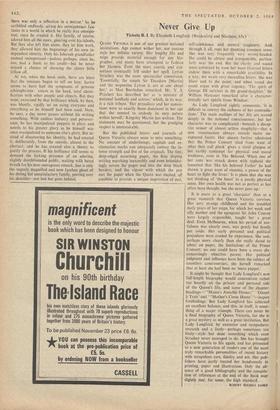Never Give Up •
Victoria R. I. By Elizabeth Longford. (Weidenfeld and Nicolson, 63s.) QUEEN Vicroata is one of our greatest national institutions. Age cannot wither her, nor custom stale her infinite variety. Her lengthy life and reign provide material enough for any bio- grapher, and many have attempted to fashion her likeness. Even the most caustic and cen- sorious eventually fell under her spell. Lytton Strachey was the most spectacular conversion. 'Essentially, the simple Sir Theodore [Martin] and the serpentine Lytton S. are at one about her,' as Max Beerbohm remarked. Mr. V. S. Pritchett has described her as 'a mixture of national landlady and actress,' which, in its way, is a rich tribute. 'Her prejudices and her convic- tions were so exactly those dominant in her age that she seemed to embody its very nature within herself,' Kingsley Martin has written. The statement may be questioned, but the grudging respect is unmistakable.
But the published letters and journals of Queen Victoria always seem to miss something. No amount of underlinings, capitals and ex- clamation marks can adequately convey the in- tense strength and fire of the originals. The tiny, deep-edged mourning paper, the firm sloping writing marching inexorably and even intimidat- ingly across the pages and into the deep black borders, and the vigour with which the pen met the paper when the Queen was excited, all combine to provide a unique impression of zest,
self-confidence and mental toughness. And, through it all, runs her daunting common sense. She was very frequently very wrong-headed. She could be obtuse and irresponsible, particu- larly near the end. But the clarity and sound sense conveyed by even her most frenzied letters endow them with a remarkable credibility. In a way, she wrote very masculine letters. She was blunt and to the point, and when tested she could argue with great cogency. 'The spirit of George III survives in the grand-daughter,' Sir William Harcourt remarked after -a character- istically tart epistle from Windsor.
As Lady Longford rightly comments, 'it is difficult to convey the richness of her contradic- tions.' The main outlines of her life are scored deeply in the national consciousness, but her character was so complicated—beneath a decep- tive veneer of almost artless simplicity—that a new examination always reveals more un- expected , facets. Her almost furtive admission that the, Prince Consort 'died from want of what they call pluck' gives a vivid glimpse of her earthy contempt for physical and moral weakness, even in The Beloved. When one of her sons was struck down with typhoid she lamented that 'like his beloved Father' he had shown 'a great want of stamina, a power of the heart to fight the fever.' It is plain that she was not thinking of 'the heart' in a purely physical sense. Her own health was not as perfect as has often been thought, but she never gave up.
It is more as a great 'character' than as a great monarch that Queen Victoria survives. Her very strange childhood and the troubled early years of her reign, for which her weak and silly mother and the egregious Sir John Conroy were largely responsible, taught her a great deal. Even Melbourne, when his period of use- fulness was clearly over, was gently but firmly put aside. Her early personal and political prejudices were eroded by experience. She saw, perhaps more clearly than she really dared to admit on paper, the limitations of the Prince Consort; no one could have been a more dis- concertingly objective parent. Her political judgment and influence have been the subject of countless controversies; she herself remarked that at least she had been no 'mere puppet.'
It might be thought that Lady Longford's new full-length biography would concentrate rather too heavily on the private and personal side of the Queen's life, and some of the chapter- . headings—' "Mama's Amiable Dinner," "Dinner a Trois' and "Mother's Come Home" '—inspire forebodings. But Lady Longford has achieved an excellent balance, and this, in itself, is some- thing of a major triumph. There can never be a final biography of Queen Victoria, for she is a great mystery as well as a great institution. But Lady Longford, by extensive and sympathetic research and a lively—perhaps sometimes too lively—style has done something which even Strachey never managed to do. She has brought Queen Victoria to life again, and has presented to a new generation of readers one of the most truly remarkable personalities of recent history with scrupulous care, fidelity and wit. Her pub- lishers have justly treated her handsomely in printing, paper and illustrations. Only the ab- sence of a good bibliography and the compila- tion of references at the end of the book may slightly mar, for some, the high standard.
ROBERT RHODES JAMES














































 Previous page
Previous page